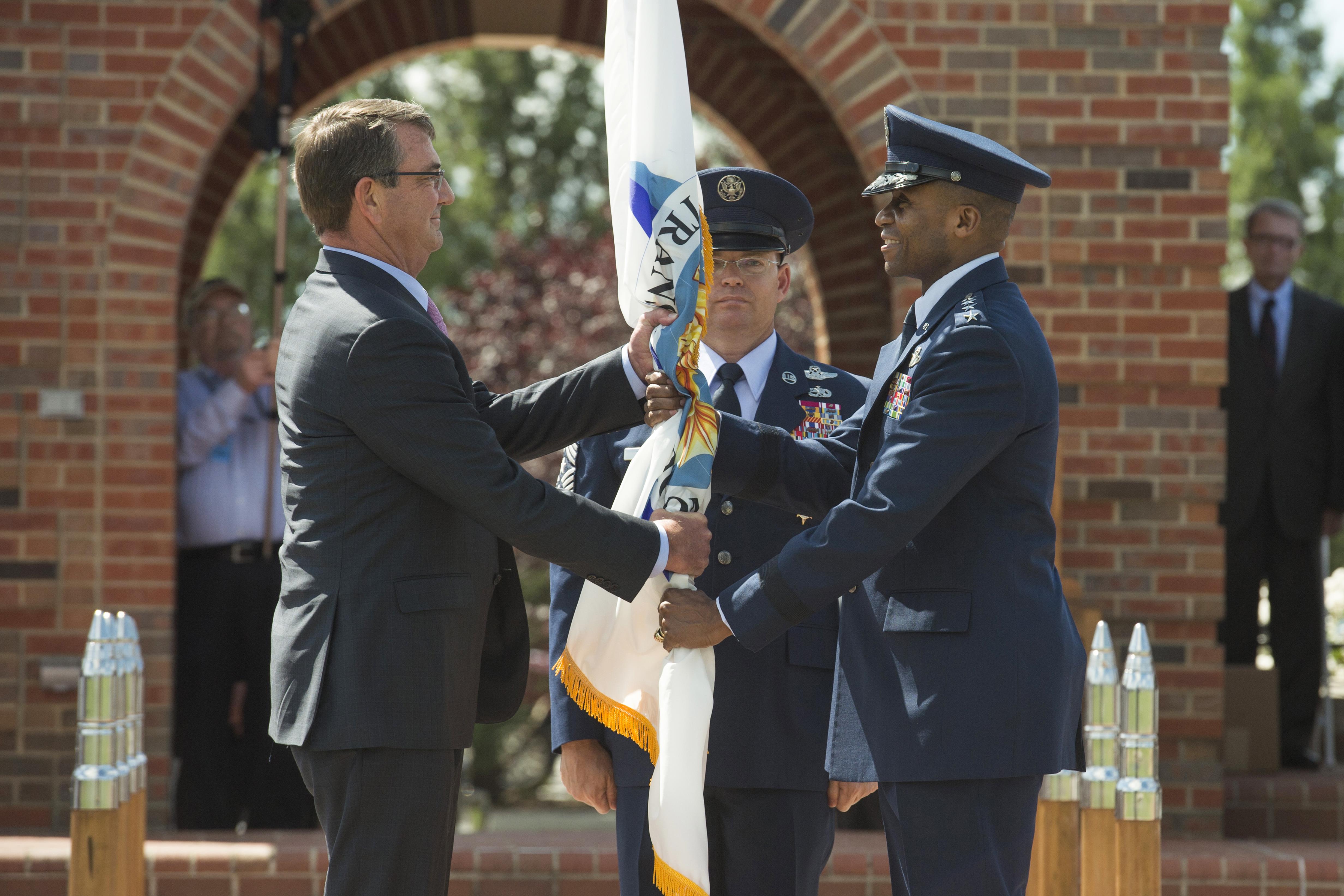By Amaani Lyle DoD News Features, Defense Media Activity
WASHINGTON, August 26, 2015 — As Air Force Gen. Darren McDew
took U.S. Transportation Command’s reins during an assumption-of-command
ceremony at Scott Air Force Base, Illinois, today, Defense Secretary Ash Carter
noted the general’s credentials for his new post.
Carter said McDew’s teachers recognized his potential, and
that later, when leaders named him regimental commander at Virginia Military
Institute, the general’s commitment to service became a hallmark of his
educational and professional journey.
“For more than three decades in our Air Force, whether at
the squadron, wing or group level, General McDew has stood out for his uncommon
ability to lead,” Carter said, adding that the four-star leader brings “an
understanding of military logistics from the inside out” to the command, which
provides for the Defense Department’s mobility needs around the globe.
A Tested Operator
“He is a tested operator who has logged more than 3,000
hours on tankers, C-17s and C-130s, and delivered critical support and supplies
to soldiers, sailors, airmen and Marines on several continents.”
In providing the flexibility and mobility to execute
missions globally, much of Transcom’s strength, Carter explained, stems from
its ability to evolve, adapt and respond quickly to new challenges and demands.
The secretary recalled that while serving as undersecretary
of defense for acquisition, technology and logistics, he saw firsthand how
Transcom supported deployed troops who toiled during the ramp-up days in
Afghanistan.
“It was one of the most difficult places in the world to
wage a war,” the secretary said. “It has … some of the most forbidding terrain
imaginable, limited transportation system, and landlocked to boot.” And yet,
Carter said, U.S. forces were able to surge forces and build hundreds of
forward and contingency bases during a period of heated conflict.
But Transcom’s complex logistical orchestration, once dubbed
the “Afghanistan miracle,” now must morph strategically into preparation for
meeting challenges from high-end adversaries, which he said will require major
logistical lift.
Reform, Innovation Are Critical
“As we reduce our focus on counterinsurgency and place more
emphasis on full-spectrum, rapid response capabilities, Transcom’s ability to
reform and innovate will become more critical,” Carter said.
The secretary’s ongoing Force of the Future discussions have
highlighted examples of technology and innovation, and he reported that
Transcom already has improved its capacity to track deliveries in real time and
predict with greater accuracy the arrival of shipments.
“These reforms have allowed our forces in the field to plan
more effectively and efficiently and help bring costs down,” the secretary
said.
Transcom also has strengthened and streamlined efforts with
private sector providers, Cater said. “By finding new ways to use existing
commercial infrastructure, by spurring greater competition among private sector
partners, Transcom continues to make our operations more cost effective,” he
added.
The command’s commitment to expanding these reforms remains
vital, and with good reason, Carter said.
Value for the Taxpayer
“As we deliver for the warfighter, we have an obligation to
deliver value for the taxpayer as well,” he said, noting the importance of
Congress allowing a budget for Transcom that charts a responsible course and
invests in its people. “When we’re forced to make irresponsible cuts, it’s
readiness that suffers first,” The secretary said.
Carter commended McDew’s breadth of experience. “Through
serving as military aide to the president and as vice director of strategic
plans at the Pentagon,” he said, “he has developed a keen, strategic
understanding of the judicious and effective use of American power.”
But McDew’s stalwart commitment to the enrichment and
development of what he described as the military’s most valuable asset --
people -- is what distinguishes him among leaders, Carter said. He noted that
as McDew assumes the vital command, he succeeds Air Force Gen. Paul Selva, now
the 10th vice chairman of the Joint Chiefs of Staff.
“That the president has nominated some of our most
distinguished military leaders to assume this command speaks volumes about the
vital importance of Transcom and its people,” he said.
Whether enabling the United States to lead a global Ebola
containment effort in West Africa, helping the United States to save lives and
provide urgent relief to Yazidis on Mount Sinjar in northern Iraq or delivering
70,000 pounds of rescue operations supplies to Nepal after its earthquake,
Transcom ensures American power can reach anywhere, Carter said.
“We know the people of Transcom will carry forward a
steadfast commitment to deliver what our force requires, whenever, wherever
they require it,” he added.









No comments:
Post a Comment